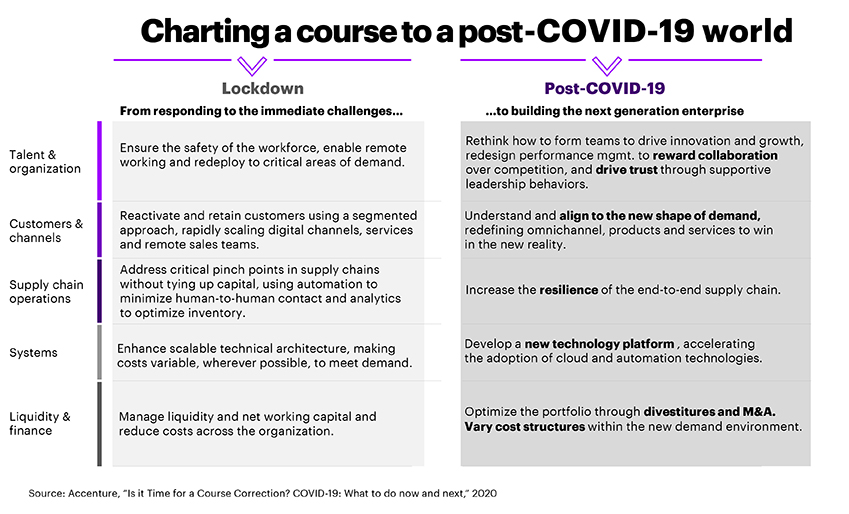Constant course-correction is critical to appropriately outmaneuver uncertainty.
By Manish Sharma, group chief executive of Accenture Operations
After the shock of economic shutdown, businesses have entered a hard-won phase of reopening. But as Accenture’s recent report explores, bolder companies have looked to the future with a spirit of reinvention—accelerating digital transformation, establishing variable cost structures and implementing agile operations.
However, COVID-19 isn’t a linear threat. Some countries are yet to see a peak, while others are facing a potential second wave. Holding true to their reinvention plans, manufacturers must now also consider how the pandemic’s progress, strength or recurrence in different geographies will affect recovery strategies.
Manufacturers can outmaneuver this uncertainty by course correcting, again and again, as circumstances change. But doing so correctly requires that they reassess their basic business assumptions, re-evaluate future scenarios and strengthen their ability to sense and respond.
The good news is that a majority of companies appear equal to this task. Seventy-four percent of the C-suite executives we spoke to for our research said they plan to completely rethink their processes and operating models to be more resilient – and many called out supply chain resilience as a priority.
From our work with clients from a wide range of industries, including manufacturing, we’ve identified three core anchors that companies should cling to as they navigate COVID-19:
These anchors are important because they help manufacturers deal with an environment where variance is the only constant. Regional divergence in responses to the pandemic is perhaps the chief variance that companies must deal with.

As the impact of COVID-19 continues to be felt, many businesses have started to chart their journey to recovery.
In and of itself the pandemic is tricky to pin down. But what makes the situation even more difficult to manage is the fact that the virus impacts different countries, regions, cities and towns in different ways, according to their unique circumstances.
In Brazil, for example, conflicting responses between the local and national government has resulted in a somewhat disjointed response. The UK, meanwhile, moved from an initially slow response to an effective and well observed lockdown; although issues around its track and trace system, as well as shifts in public behavior, are creating new risks. And then there’s Vietnam – so far one of the only success stories of the pandemic. There, a well-designed public health system and a containment strategy based on comprehensive testing, tracing and quarantining has served the country and its citizens very well.
To deal with the fragmented nature of this global pandemic, manufacturers need to take a localized approach. Those best equipped to handle are the local people with first-hand experience of the complexities facing them. So, at a bare minimum, businesses need to ensure their local leaders are empowered to make decisions at speed. Global leaders must keep a close eye on these local responses to identify successes that could be applied to other markets or used in similar scenarios.
For many manufacturers, increasing the responsiveness and dexterity between global and local businesses may be easier said than done. Within one organization, there will often be a broad spectrum of competencies across local operations, making it hard to come up with one global playbook. However, there are several ways in which manufacturers can increase their global-local dexterity.
First, companies should retool their operations to enable agility. Intelligent enterprise systems are essential both to improving the speed and quality of decision making and repurposing capacity across locations. But this cannot be a technological response alone. True dexterity will come from putting in place a distributed approach of people and technology. Finally, manufacturers can future-proof the operating model by embracing innovative changes that proved effective during lockdown and which can help them reposition for the changed shape of demand.
Manufacturers have always had to deal with a degree of uncertainty, but change was much slower than it is today, and companies had plenty of time to react. In our new world, manufacturers must outmaneuver change constantly.
Businesses must therefore prioritize strategies that allow for regional dexterity and are laser-focused on the workers, customers and partners that are reshaping market demand and causing businesses to reimagine their operations. Manufacturers that can effectively predict, prepare, sense and respond to change will be able to correct course appropriately and navigate those rapids. These will be the same organizations that have accelerated their digital transformations and successfully embraced cloud, AI, analytics, flexible IT infrastructure and intelligent operations.

Manish Sharma
Manish Sharma is group chief executive of operations services. In this role, he oversees Accenture’s comprehensive portfolio of business process services for specific business functions, including finance, procurement and supply chain, marketing and sales, as well as industry-specific services, such as banking, insurance and health services.
In this episode, I sat down with Beejan Giga, Director | Partner and Caleb Emerson, Senior Results Manager at Carpedia International. We discussed the insights behind their recent Industry Today article, “Thinking Three Moves Ahead” and together we explored how manufacturers can plan more strategically, align with their suppliers, and build the operational discipline needed to support intentional, sustainable growth. It was a conversation packed with practical perspectives on navigating a fast-changing industry landscape.